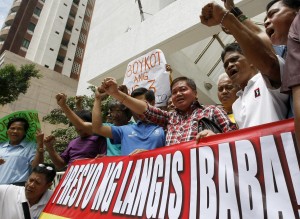
Protesters, mostly public transport drivers, shout slogans as they picket the office of Shell, one of the big three oil companies in the country, during a protest against the almost-weekly rising prices of oil and other oil products Monday March 19, 2012 at the financial district of Makati city. The Department of Energy has admitted that it remains helpless in bringing down prices that are largely influenced by movements in the global oil market. AP PHOTO/BULLIT MARQUEZ
Local pump prices for gasoline are now hovering around the record high of P60 a liter, and the Department of Energy (DoE) has admitted that it remains helpless in bringing down prices that are largely influenced by movements in the global oil market.
But Energy Secretary Jose Rene D. Almendras assured the public that the DoE was doing what it could under the law to minimize the effects of high oil prices.
“Even the president of the United States acknowledged that he has no silver bullet to solve this global problem of fuel prices. That is from one of the world’s most powerful personalities,” Almendras said in a text message.
Under the Oil Deregulation Law, the government is prohibited from interfering in the pricing of local petroleum products.
But what the government can do now, according to Almendras, is to ease the impact of rising fuel prices on the public transport sector, through the reloading of fuel smart cards under the government’s P450-million Pantawid Pasada Program.
Under this stop-gap measure, jeepney drivers who claimed their fuel smart cards last year will be given another P1,200, on top of the P1,050 given to them last year, which they can use to buy fuel.
Almendras said that the DoE aims to complete the reloading before month’s end.
Meanwhile, Zenaida Y. Monsada of the DoE’s Oil Industry Management Bureau, said in a radio interview Monday morning that what the DoE will do is to strictly monitor price adjustments made by oil companies on a weekly basis.
Monsada likewise appealed for greater understanding from the public, explaining that the DoE was doing everything it could within its mandate.
Monsada earlier said that in order to lessen the country’s dependence on imported oil, the DoE had initiated moves to adopt cleaner indigenous fuel. The most feasible alternatives identified were liquefied petroleum gas, compressed natural gas, biofuels and even electricity.
Also, Energy Undersecretary Jose M. Layug Jr. said that the DoE had already laid down its short-, medium- and long-term plans to cut costly fuel imports and lessen the vulnerability of the Philippines in the event of a surge in global oil prices. These measures, in effect, would cushion the country from volatile oil price fluctuations.